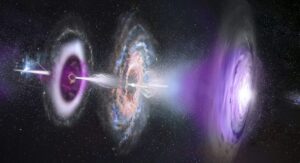Black holes are some of the most mysterious and fascinating objects in the cosmos. They are regions of space where gravity is so strong that nothing, not even light, can escape. Scientists have long wondered how many black holes there are in the universe, and how they form and evolve.
A new study, led by researchers from Italy and the UK, has shed some light on these questions. Using a sophisticated model of stellar evolution and galaxy formation, they estimated that there are around 40 billion billions (4 x 10^19) stellar-mass black holes in the observable universe. That means that about 1% of the ordinary matter in the universe is locked up in these invisible objects.
Stellar-mass black holes are formed when massive stars die and collapse under their own gravity. The study found that the rate and mass of star formation, as well as the metallicity of galaxies (the abundance of elements heavier than hydrogen and helium), play a crucial role in determining how many black holes are produced.
The researchers also suggested that these stellar-mass black holes could be the seeds for supermassive black holes, which are millions or billions of times more massive than the sun and lurk at the centers of most galaxies. By merging with each other and accreting gas from their surroundings, these smaller black holes could grow into larger ones over time.
The study, published in The Astrophysical Journal, is an important step towards understanding the origin and evolution of black holes in the universe. The authors hope to further investigate how supermassive black holes form and how they affect their host galaxies in future work.
Reference(s):


